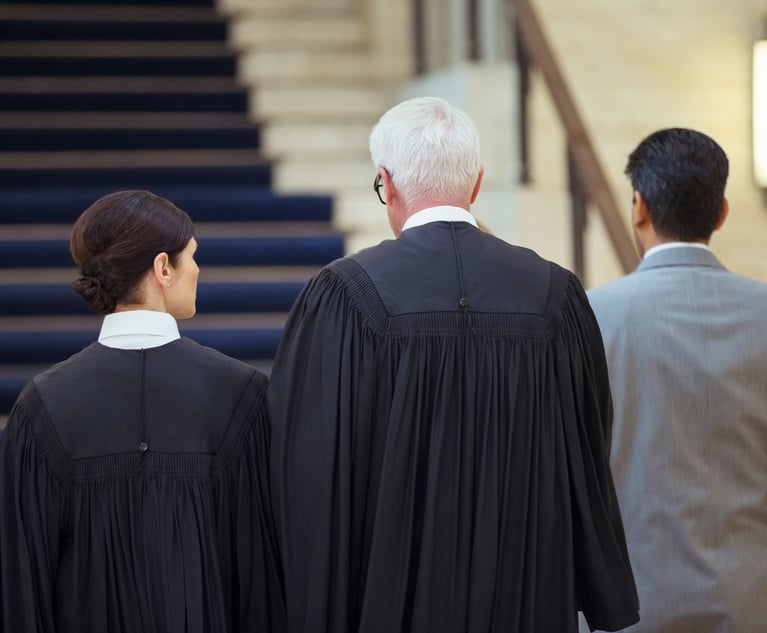Judicial Ethics Opinion 19-130
A judge may appoint a retired judge to the roster of neutrals for the same trial-level court in which he/she previously served, provided the appointment is made impartially and on the basis of merit.
July 21, 2020 at 09:55 AM
5 minute read
The Advisory Committee on Judicial Ethics responds to written inquiries from New York state's approximately 3,600 judges and justices, as well as hundreds of judicial hearing officers, support magistrates, court attorney-referees, and judicial candidates (both judges and non-judges seeking election to judicial office). The committee interprets the Rules Governing Judicial Conduct (22 NYCRR Part 100) and, to the extent applicable, the Code of Judicial Conduct. The committee consists of 27 current and retired judges, and is co-chaired by former associate justice George D. Marlow of the Appellate Division and the Honorable Margaret Walsh, a justice of the Supreme Court.
Digest: A judge (1) may appoint a retired judge to the roster of neutrals for the same trial-level court in which he/she previously served, provided the appointment is made impartially and on the basis of merit; (2) may refer matters to the retired judge for mediation, unless he/she determines their relationship would create an appearance of impropriety; (3) may consider and decide the retired judge's fee applications for mediation services, unless the judge determines their relationship might improperly influence the judge's conduct or judgment.
Rules: 22 NYCRR 16.1; 36.1(a); 36.2(c)(5); 100.2; 100.2(A); 100.2(B); 100.3(C)(3); 100.3(E)(1); 146.4(a)(2); 146.4(b); Opinion 12-37.
Opinion: A judge asks if he/she may approve an application of a former trial-level judge, who retired less than two years ago, to serve on a roster of neutrals in the same court where he/she previously served (see 22 NYCRR Part 146). [1] The judge also asks if he/she may refer matters to the retired judge for mediation and/or decide the retired judge's fee applications for mediation services.
A judge must always avoid even the appearance of impropriety (see 22 NYCRR 100.2) and must always act in a manner that promotes public confidence in the judiciary's integrity and impartiality (see 22 NYCRR 100.2[A]). For example, a judge must "not allow family, social, political or other relationships to influence the judge's judicial conduct or judgment" (22 NYCRR 100.2[B]) and must disqualify him/herself in proceedings where his/her impartiality "might reasonably be questioned" (22 NYCRR 100.3[E][1]). A judge must "exercise the power of appointment impartially and on the basis of merit," avoiding both nepotism and favoritism (22 NYCRR 100.3[C][3]). Also, with respect to court appointments governed by Part 36, "[n]o former judge … shall be appointed, within two years from the date the judge left judicial office, by a court within the jurisdiction where the judge served (22 NYCRR 36.2[c][5]).
On its face, Part 146 does not bar the appointment of former judges to a court's roster of neutrals. To the contrary, those "who have served at least five years as a judge with substantial experience in the specific subject area of the cases that will be referred to them" (22 NYCRR 146.4[a][2]), or who have "recent experience mediating actual cases in the subject area of the types of cases referred to them" (22 NYCRR 146.4[b]), may be appointed to a court roster after completing the requisite training. We also see nothing to suggest that Part 36 applies to Part 146 appointments. [2] Thus, this judge may approve the retired judge to serve on the court's roster of neutrals, provided the appointment is made "impartially and on the basis of merit" (22 NYCRR 100.3[C][3]).
The judge also asks if he/she may refer matters to the retired judge for mediation, in the same court where he/she previously served. As we observed in Opinion 12-37 (citations omitted):
[A] judge is not necessarily disqualified from presiding when a former judge of the same court appears before him/her. Rather, each currently presiding judge must determine whether his/her relationship with the former judge creates an appearance of impropriety or causes his/her impartiality to reasonably be questioned. The Committee has further advised that a judge may ask relevant questions to determine if a former judge's current role representing clients presents a conflict or creates an appearance of impropriety.
Accordingly, the judge may refer mediation matters to the retired judge, after he/she exercises due diligence to ensure his/her impartiality would not reasonably be questioned in making such referrals (see id.).
We likewise conclude this judge may consider and decide fee applications that may be sought by the retired judge for mediation services, unless he/she determines their relationship would impair the exercise of independent judgment (cf. 22 NYCRR 100.2[B]).
[1] Although appellate court judges may not appear in person in their former appellate court for two years (see 22 NYCRR 16.1; Opinion 12-37 fn 1), we are aware of no such limitation on trial court judges.
[2] Section 36.1(a) lists the court appointments governed by Part 36. Although it includes terms such as "guardians" and "court evaluators," it does not include terms such as "mediators," "roster of neutrals," or "Part 146″ (see 22 NYCRR 36.1[a]).
This content has been archived. It is available through our partners, LexisNexis® and Bloomberg Law.
To view this content, please continue to their sites.
Not a Lexis Subscriber?
Subscribe Now
Not a Bloomberg Law Subscriber?
Subscribe Now
NOT FOR REPRINT
© 2024 ALM Global, LLC, All Rights Reserved. Request academic re-use from www.copyright.com. All other uses, submit a request to [email protected]. For more information visit Asset & Logo Licensing.
You Might Like
View AllTrending Stories
- 1Call for Nominations: Elite Trial Lawyers 2025
- 2Senate Judiciary Dems Release Report on Supreme Court Ethics
- 3Senate Confirms Last 2 of Biden's California Judicial Nominees
- 4Morrison & Foerster Doles Out Year-End and Special Bonuses, Raises Base Compensation for Associates
- 5Tom Girardi to Surrender to Federal Authorities on Jan. 7
Who Got The Work
Michael G. Bongiorno, Andrew Scott Dulberg and Elizabeth E. Driscoll from Wilmer Cutler Pickering Hale and Dorr have stepped in to represent Symbotic Inc., an A.I.-enabled technology platform that focuses on increasing supply chain efficiency, and other defendants in a pending shareholder derivative lawsuit. The case, filed Oct. 2 in Massachusetts District Court by the Brown Law Firm on behalf of Stephen Austen, accuses certain officers and directors of misleading investors in regard to Symbotic's potential for margin growth by failing to disclose that the company was not equipped to timely deploy its systems or manage expenses through project delays. The case, assigned to U.S. District Judge Nathaniel M. Gorton, is 1:24-cv-12522, Austen v. Cohen et al.
Who Got The Work
Edmund Polubinski and Marie Killmond of Davis Polk & Wardwell have entered appearances for data platform software development company MongoDB and other defendants in a pending shareholder derivative lawsuit. The action, filed Oct. 7 in New York Southern District Court by the Brown Law Firm, accuses the company's directors and/or officers of falsely expressing confidence in the company’s restructuring of its sales incentive plan and downplaying the severity of decreases in its upfront commitments. The case is 1:24-cv-07594, Roy v. Ittycheria et al.
Who Got The Work
Amy O. Bruchs and Kurt F. Ellison of Michael Best & Friedrich have entered appearances for Epic Systems Corp. in a pending employment discrimination lawsuit. The suit was filed Sept. 7 in Wisconsin Western District Court by Levine Eisberner LLC and Siri & Glimstad on behalf of a project manager who claims that he was wrongfully terminated after applying for a religious exemption to the defendant's COVID-19 vaccine mandate. The case, assigned to U.S. Magistrate Judge Anita Marie Boor, is 3:24-cv-00630, Secker, Nathan v. Epic Systems Corporation.
Who Got The Work
David X. Sullivan, Thomas J. Finn and Gregory A. Hall from McCarter & English have entered appearances for Sunrun Installation Services in a pending civil rights lawsuit. The complaint was filed Sept. 4 in Connecticut District Court by attorney Robert M. Berke on behalf of former employee George Edward Steins, who was arrested and charged with employing an unregistered home improvement salesperson. The complaint alleges that had Sunrun informed the Connecticut Department of Consumer Protection that the plaintiff's employment had ended in 2017 and that he no longer held Sunrun's home improvement contractor license, he would not have been hit with charges, which were dismissed in May 2024. The case, assigned to U.S. District Judge Jeffrey A. Meyer, is 3:24-cv-01423, Steins v. Sunrun, Inc. et al.
Who Got The Work
Greenberg Traurig shareholder Joshua L. Raskin has entered an appearance for boohoo.com UK Ltd. in a pending patent infringement lawsuit. The suit, filed Sept. 3 in Texas Eastern District Court by Rozier Hardt McDonough on behalf of Alto Dynamics, asserts five patents related to an online shopping platform. The case, assigned to U.S. District Judge Rodney Gilstrap, is 2:24-cv-00719, Alto Dynamics, LLC v. boohoo.com UK Limited.
Featured Firms
Law Offices of Gary Martin Hays & Associates, P.C.
(470) 294-1674
Law Offices of Mark E. Salomone
(857) 444-6468
Smith & Hassler
(713) 739-1250










